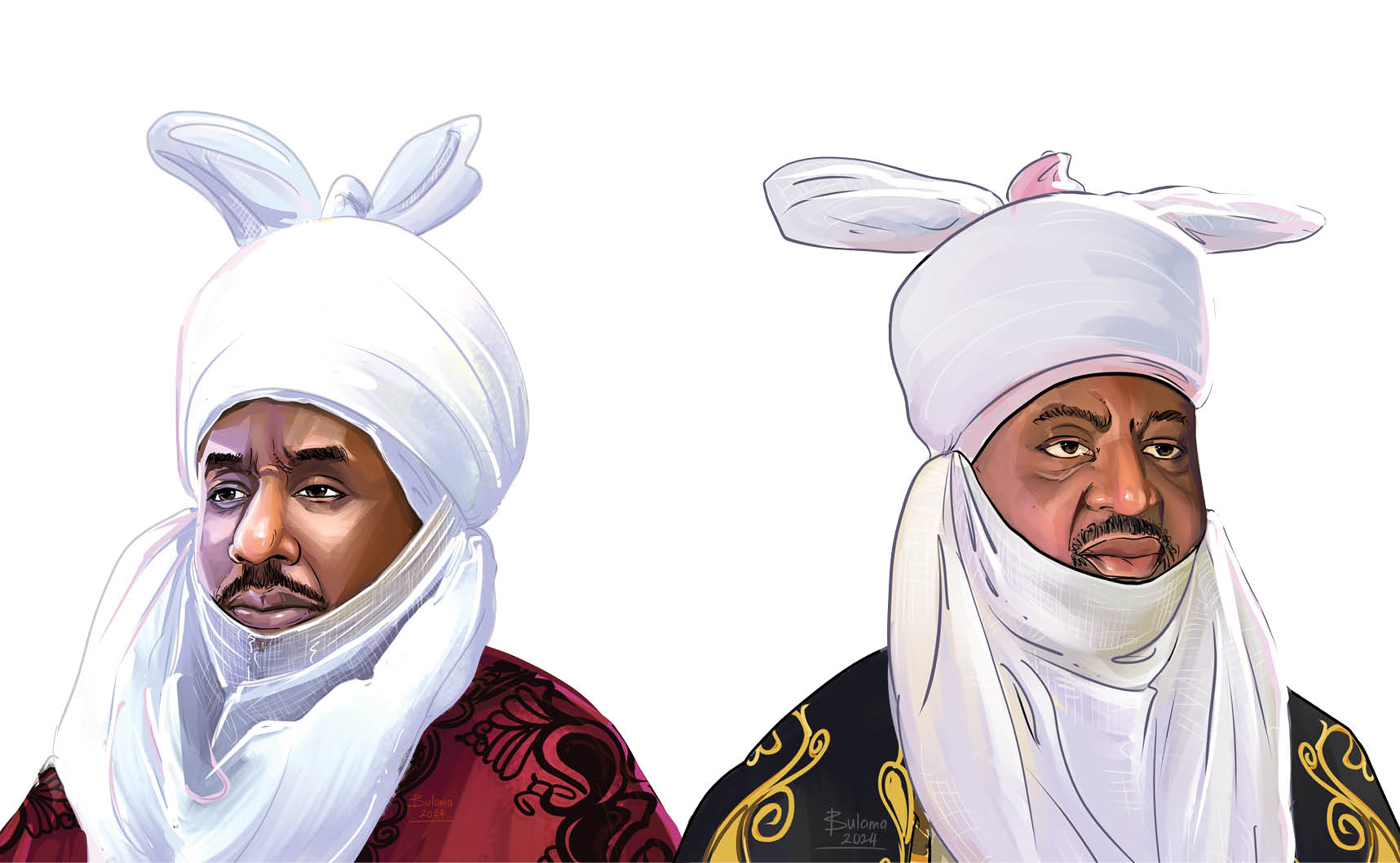Kano’s dangerous ‘Game of Thrones’
It was the Prussian general and military theorist Carl Von Clausewitz who said war is continuation of politics by other means. This famous quote came to mind when the drama in Kano over claims to the commercial city’s throne played out significantly yesterday. Muhammad Sanusi II was reinstated as the 16th Fulani Emir of Kano […]

sanusi, bayero
It was the Prussian general and military theorist Carl Von Clausewitz who said war is continuation of politics by other means.
This famous quote came to mind when the drama in Kano over claims to the commercial city’s throne played out significantly yesterday.
Muhammad Sanusi II was reinstated as the 16th Fulani Emir of Kano by Governor Abba Kabir Yusuf on Friday, May 24, 2024. But by the morning after (May 25, 2024), Aminu Ado Bayero, who was deposed on Thursday, May 23, 2024, following the passage of the Kano Emirates Council (Amendment) Bill by the state House of Assembly, and its assent by Governor Yusuf, had staged a comeback.
Sanusi is not only married to a daughter of Alhaji Ado Bayero, he is also a second cousin to Aminu Ado Bayero; his father, the late Chiroman Kano, Aminu Sanusi being a nephew to the late Emir Ado Bayero.
- Emirate tussle: What Sanusi told security chiefs at crucial meeting – sources
- Drama, Intrigues As Sanusi, Bayero Hold Court In 2 Palaces
The two are now are at daggers drawn over who should occupy the exalted Kano throne that existed for hundreds of years.
The drama and the intrigues in this fight by cousins, reminiscent of the Kano civil war fought between 1893 and 1895, has been described by many keen observers as “rather unfortunate”.
Just as it is happening now, the bloody Kano civil war was fought among cousins. It was fought between the children of Sarkin Kano Abdullahi Maje Karofi (Yusufawa) and those of his younger brother, Sarkin Kano Bello (Tukurawa).
When in June 2014 the late Emir Ado Bayero died, the then PDP-led federal government under Goodluck Jonathan hastily sent messages congratulating Lamido Sanusi Ado Bayero as the new emir, even before a formal announcement of the late Bayero’s successor.
This possibly infuriated the ruling APC government in Kano led by Engineer Rabiu Musa Kwankwaso, which subsequently announced the then suspended governor of the Central Bank of Nigeria (CBN), Sanusi Lamido Sanusi as the new emir.
All children of the departed emir pledged their allegiance to the new emir but Chiroma Lamido, who apparently felt slighted by missing out the throne that his father occupied for over 50 years.
Emir Sanusi will later dethrone the Chiroma, who relocated to Abuja and was made the managing director of the the Nigerian Ports Authority, NPA, by the Jonathan government.
The emir also stripped Bashir Ado Bayero, the Danlawan from the district headship of Takai, for insubordination.
It was this kind of politically charged atmosphere and internal strife among the royal family that set the stage for the War between Yusufawa and Tukurawa.
According to historical accounts, Sarkin Kano Bello removed some children of his brother from their titles and territories and compelled husbands of the female ones among them to divorce them.
Only two sons of Maje Karofi, historical accounts said, pledged allegiance to Sarkin Kano Tukur when he succeeded his father, Bello.
Emir Sanusi was to face the toughest battle of his life when in 2019 Governor Abdullahi Umar Ganduje created four additional emirates besides Kano: Bichi, Gaya, Karaye and Rano. Ganduje also appointed Wamban Kano, Aminu Ado Bayero as the first emir of the newly created Bichi emirate.
Beyond the symbolic elevation of Bichi Emir, the action created not only deep division among the royals but also along party lines.
PDP adherents were seen as sympathetic to the cause of Emir Sanusi, who was battling to undo the balkanisation and restore his authority over the entire Kano.
The politics of the creation of new emirates was seen by the opposition (Kwankwaso and his allies had defected from the APC to the PDP) as political landmines buried by the Ganduje administration to perpetuate himself as a leading political gladiator after completing his 8th year as governor.
Ganduje succeeded Kwankwaso, whom he had parted ways with few months into his first term in office, as governor of Kano State.
While the ruling APC was happy with the new emirates it created (at least they believe the people were happy with the decentration of traditional authority to their door steps), NNPP, with Kwankwaso as its natural leader, tailored its campaign around remedying the perceived wrongs of the government headed by Ganduje.
Little wonder that when the party won the 2023 governorship election in Kano many believed that scrapping the new emirates was a done deal. Calls for the reinstatement of Sanusi reverberated among the Kwankwasiyya faithful much to the embarrassment of the emir and staunch APC supporters.
With the the eventual reinstatement of Sanusi and the return of Bayero deposed two days ago and the drama that followed, the relative peace in Kano is apparently on edge.
Professor Kamilu Sani Fagge, a professor of political science at the Bayero University, Kano, believes that the prestige and reverence the traditional institutions enjoyed for hundreds of years have been eroded by partisan politics.
Fagge said politics in Nigeria is no longer a service-rendering venture but an enterprise to achieve self interests.
To address the continued slide of the once respected and revered institution, the professor said politics must be insulated from traditional authority just like in the United Kingdom.
British monarchy is insulated from politics in a way that the succession system is perfected to the extent that the heir apparent to the throne is usually a direct descendant of the departed monarch in order of birth.
